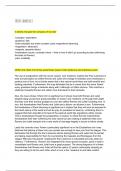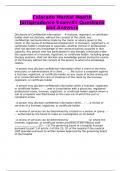Friar Lawrence
‘it strains me past the compass of my wits'
-compass- exploration
-guidance, fate
-looks simplistic but works complex (uses magnetism)-deceiving
-magnetism- attraction]
-magnets, opposite attract
-foreshadow unsure, uncertain future – links to how it didn’t go according to plan (delivering
the letter to Romeo)
-past- instability
‘Within the infant rind of this weak flower poison hath residence and medicine power’
The use of juxtaposition with the nouns ‘poison’ and ‘medicine’ implies that Friar Lawrence is
wise and perceptive as unlike Romeo and Juliet who indulge in fantasies and romanticize a
poetical sort of love, he is bluntly aware that in the natural world there are both harmful and
healing potentials. Furthermore, this may delineate that as it comes from the same ‘flower’
every goodness brings a badness along with it although not often obvious. This could be a
statement towards Romeo and Juliet’s love that leads to their hamartia.
Also, the noun phrase ‘infant rind’ is significant as it shows how both Romeo and Juliet
despite being young have great possibility of ‘poison' and ‘medicine' (is through their death
that they cure their ancient grudges but can also reflect Romeo and Juliet’s budding love. In
turn, this foreshadows that Romeo and Juliet are to bloom -an allusion to sex. Furthermore,
the foreshadow of them blooming is significant as it implies that they will soon be exposed to
the harsh nature of the world and will be prey for predators to feast on- victimizing them to
suggest that their downfall is the fault of the external world like regulations within society.
This is emphasised through the juxtaposition of ‘poison' in which the friar inadvertently
foreshadows their fate- furthering his wise nature but also making a statement that once
Romeo and Juliet transpire into a new world of marriage tragedy is bound to follow shortly.
Lastly the concrete noun ‘flower’s particularly significant as in the Elizabethan era it was
believed that placing a flower into your pocket was enough to save you from the plague. This
delineates that through the friar Lawrence almost placing Romeo and Juliet into his pocket
and taking responsibility for them he is protecting the Capulets and Montagues from the
‘plague’ Mercutio has placed- implying the friar Lawrence is calculated and only seeks an
‘alliance’. Furthermore, ‘flowers' are integrated into every special occasion, good or bad to
consolidate how Romeo and Juliet have a great purpose. The strong fragrance of a flower
foreshadows that Romeo and Juliet will find the option of ‘poison' particularly tempting as
they are willing to die for each other which in turn is the ‘medicine to end futile conflict.
, ‘The sweetest honey is loathsome in its own deliciousness'
In this quote, the friar s effectively stating that Romeo and Juliet’s love is so intense, and that
this intensity is unnatural and will burn itself over time like ‘fire and gunpowder. Therefore,
foreshadowing tragedy as he states that this moment is fleeting, and their love is far too
sweet, hence unbearable. The friar pairs images of happiness with images of violence
consistently- creating a pervasive atmosphere of impending doom.
The noun ‘honey’ is also used by Romeo to describe Juliet when he thinks that she has died.
The noun ‘honey foreshadows the tragedy because of Juliet and Romeos highlighting
passionate and sensual love that lacks true substance to it. This can be seen through how
‘honey’ when heated to high temperatures can turn poisonous. This implies that Romeo and
Juliet’s love was far too lustful and therefore this acts as a poison and kills them.
Furthermore, in Greek mythology ‘honey’ is thought to be a source of poetry delineating that
Romeo and Juliet forced themselves into a poetical and fantastical love as can be seen
through their sonnet together and that this will lead to their very downfall. Shakespeare is
criticising the Petrarchan love forced onto people in the Elizabethan society- stating that
idealisation is highly damaging and does far worse than good because it drives people into
fantasies whereby at that point they can no longer be satisfied by reality -leading to dismay.
In the Elizabethan era ‘honey had great cosmetic purposes so for the women to meet beauty
standards- this reflects their idealized love that has been shaped by society- society is
responsible for bringing Petrarchan love.
In contrast, however their love which is like ‘honey is portrayed as revolutionary as it
symbolises medicine due to its antiseptic properties. Therefore, delineating that this love is a
step towards the reconciliation of an ‘ancient grudge’ because we can infer that their love will
cure disease and so the toxic feud between the families and so is actually healing the
‘plague that comes upon their houses.
Also, the Friar is depicted as quite selfish. In this quote he describes their love to be like
‘homey' which in Greek mythology is the beloved food of the God’s. This implies that the friar
is feasting on their love: through foreshadowing he knows that their love has a chance of
leading to tragedy, yet he still prompts them on so that they can turn their ‘households'
rancour to pure love. This may be because he is attempting to do the good Christian thing, in
Greek mythology these Gods would feast on the honey so to reach immortality implying that
the friar dies this to reach an eternal life at heaven. Furthermore, ‘honey’ has great
nutritional properties therefore emphasising that he aims to be rewarded and benefited by
Romeo and Juliet’s hardships, ultimately conveying him as quite a deceiving and selfish
character. This may have been done on purpose by Shakespeare as the Friar is Catholic in
a time where Catholics was being punished, hence that audience are made to doubt him
and so Shakespeare may be criticising Catholicism in proving that there is indeed an
unnerving aspect of the friar.
‘it strains me past the compass of my wits'
-compass- exploration
-guidance, fate
-looks simplistic but works complex (uses magnetism)-deceiving
-magnetism- attraction]
-magnets, opposite attract
-foreshadow unsure, uncertain future – links to how it didn’t go according to plan (delivering
the letter to Romeo)
-past- instability
‘Within the infant rind of this weak flower poison hath residence and medicine power’
The use of juxtaposition with the nouns ‘poison’ and ‘medicine’ implies that Friar Lawrence is
wise and perceptive as unlike Romeo and Juliet who indulge in fantasies and romanticize a
poetical sort of love, he is bluntly aware that in the natural world there are both harmful and
healing potentials. Furthermore, this may delineate that as it comes from the same ‘flower’
every goodness brings a badness along with it although not often obvious. This could be a
statement towards Romeo and Juliet’s love that leads to their hamartia.
Also, the noun phrase ‘infant rind’ is significant as it shows how both Romeo and Juliet
despite being young have great possibility of ‘poison' and ‘medicine' (is through their death
that they cure their ancient grudges but can also reflect Romeo and Juliet’s budding love. In
turn, this foreshadows that Romeo and Juliet are to bloom -an allusion to sex. Furthermore,
the foreshadow of them blooming is significant as it implies that they will soon be exposed to
the harsh nature of the world and will be prey for predators to feast on- victimizing them to
suggest that their downfall is the fault of the external world like regulations within society.
This is emphasised through the juxtaposition of ‘poison' in which the friar inadvertently
foreshadows their fate- furthering his wise nature but also making a statement that once
Romeo and Juliet transpire into a new world of marriage tragedy is bound to follow shortly.
Lastly the concrete noun ‘flower’s particularly significant as in the Elizabethan era it was
believed that placing a flower into your pocket was enough to save you from the plague. This
delineates that through the friar Lawrence almost placing Romeo and Juliet into his pocket
and taking responsibility for them he is protecting the Capulets and Montagues from the
‘plague’ Mercutio has placed- implying the friar Lawrence is calculated and only seeks an
‘alliance’. Furthermore, ‘flowers' are integrated into every special occasion, good or bad to
consolidate how Romeo and Juliet have a great purpose. The strong fragrance of a flower
foreshadows that Romeo and Juliet will find the option of ‘poison' particularly tempting as
they are willing to die for each other which in turn is the ‘medicine to end futile conflict.
, ‘The sweetest honey is loathsome in its own deliciousness'
In this quote, the friar s effectively stating that Romeo and Juliet’s love is so intense, and that
this intensity is unnatural and will burn itself over time like ‘fire and gunpowder. Therefore,
foreshadowing tragedy as he states that this moment is fleeting, and their love is far too
sweet, hence unbearable. The friar pairs images of happiness with images of violence
consistently- creating a pervasive atmosphere of impending doom.
The noun ‘honey’ is also used by Romeo to describe Juliet when he thinks that she has died.
The noun ‘honey foreshadows the tragedy because of Juliet and Romeos highlighting
passionate and sensual love that lacks true substance to it. This can be seen through how
‘honey’ when heated to high temperatures can turn poisonous. This implies that Romeo and
Juliet’s love was far too lustful and therefore this acts as a poison and kills them.
Furthermore, in Greek mythology ‘honey’ is thought to be a source of poetry delineating that
Romeo and Juliet forced themselves into a poetical and fantastical love as can be seen
through their sonnet together and that this will lead to their very downfall. Shakespeare is
criticising the Petrarchan love forced onto people in the Elizabethan society- stating that
idealisation is highly damaging and does far worse than good because it drives people into
fantasies whereby at that point they can no longer be satisfied by reality -leading to dismay.
In the Elizabethan era ‘honey had great cosmetic purposes so for the women to meet beauty
standards- this reflects their idealized love that has been shaped by society- society is
responsible for bringing Petrarchan love.
In contrast, however their love which is like ‘honey is portrayed as revolutionary as it
symbolises medicine due to its antiseptic properties. Therefore, delineating that this love is a
step towards the reconciliation of an ‘ancient grudge’ because we can infer that their love will
cure disease and so the toxic feud between the families and so is actually healing the
‘plague that comes upon their houses.
Also, the Friar is depicted as quite selfish. In this quote he describes their love to be like
‘homey' which in Greek mythology is the beloved food of the God’s. This implies that the friar
is feasting on their love: through foreshadowing he knows that their love has a chance of
leading to tragedy, yet he still prompts them on so that they can turn their ‘households'
rancour to pure love. This may be because he is attempting to do the good Christian thing, in
Greek mythology these Gods would feast on the honey so to reach immortality implying that
the friar dies this to reach an eternal life at heaven. Furthermore, ‘honey’ has great
nutritional properties therefore emphasising that he aims to be rewarded and benefited by
Romeo and Juliet’s hardships, ultimately conveying him as quite a deceiving and selfish
character. This may have been done on purpose by Shakespeare as the Friar is Catholic in
a time where Catholics was being punished, hence that audience are made to doubt him
and so Shakespeare may be criticising Catholicism in proving that there is indeed an
unnerving aspect of the friar.



